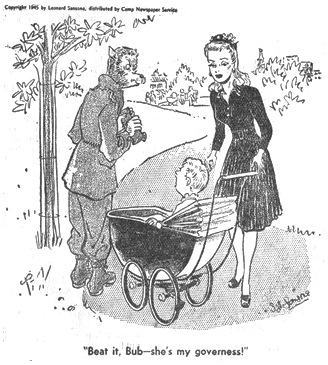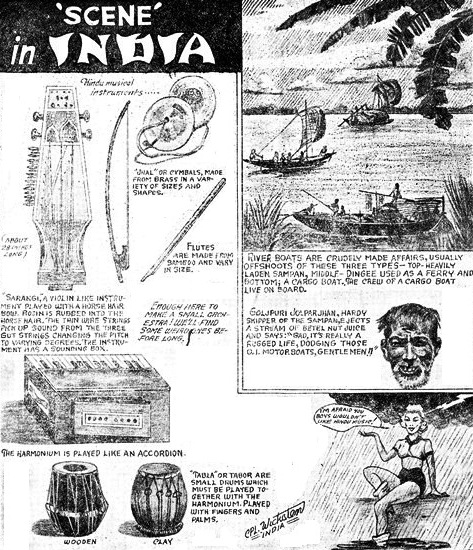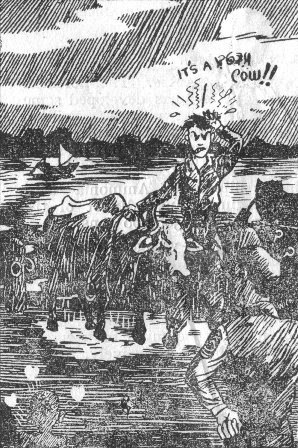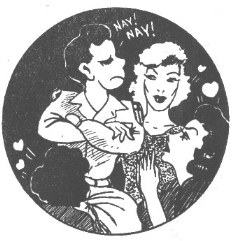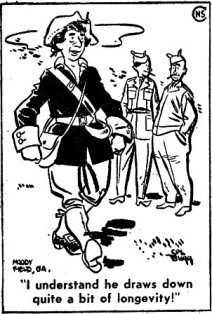GI TATOOED FROM HEAD TO FOOT
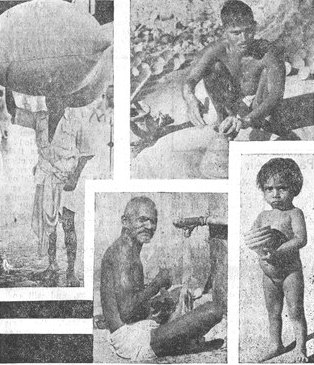 Here are four Indian glimpses for your passing parade album.
The one on the left demonstrates what huge weighty problems can be surmounted by using your head.
Upper right is a feature act of a man making clay, not hay, while the sun shines.
Lower center is a venerable happy citizen mentally singing in a bathtub which has no sides or elaborate enamel, but does boast air conditioning and space to squirm delightedly around in.
And lower right is a diminutive little saleslady, slightly peeved at being a pin-up, who seems to be saying "Jao Joe!
I don't like you, so there!
Here are four Indian glimpses for your passing parade album.
The one on the left demonstrates what huge weighty problems can be surmounted by using your head.
Upper right is a feature act of a man making clay, not hay, while the sun shines.
Lower center is a venerable happy citizen mentally singing in a bathtub which has no sides or elaborate enamel, but does boast air conditioning and space to squirm delightedly around in.
And lower right is a diminutive little saleslady, slightly peeved at being a pin-up, who seems to be saying "Jao Joe!
I don't like you, so there!
Bond Replaces Graf As Beehive Director
The Beehive has lost its dynamic director, Mae Graf, who has been transferred to Calcutta to take up the duties of assistant regional supervisor of the American Red Cross, and Mrs. Barbara Bond has been appointed director in her place.
Miss Graf has had a busy career in this theater and has turned down her opportunity to go home on rotation.
Since arriving here in April, her efforts in behalf of the Beehive have resulted in an attractive club and many friends both for the club and herself.
She will still be closely connected with the Beehive, for it falls in her area of supervision.
"I hate to leave," Mae said.
"I've enjoyed active club work and regret leaving the fine crowd of boys I've known at the Beehive.
They certainly deserve a big hand for making their new club an immediate success.
But I'll be back frequently, so I don't have to say goodbye."
Mae left Tuesday for a short rest leave before tackling her new duties.
Bobbie Bond has been in the theater nearly a year and a half as a staff assistant, program director and club director, serving at several clubs including the trainmobile in Assam.
She has been at the Beehive two months.
The new club director announces a full program for next week with at least three very special events.
Herbert Martin, whose reputation as a versatile piano soloist is well known throughout the theater, will play at the Beehive Monday evening under the auspices of EPU.
He will offer a varied program, including the swing of Fats Waller, the well known tunes of Gershwin, and the immortal music of de Falla and Bach.
The club will present a magician on Tuesday evening and on Thursday a seven piece band will entertain on the Beehive's veranda.
The club will also provide "added attractions" that evening.
|
TOLD INFAMOUS GANGSTERS
OFF WHEN HE TATOOED THEM
Sgt. Thomas Stephen of a Depot repair unit is one GI who seems to be out of the pages of Ripley's "Believe It or Not."
Tom is one of the few civilized persons in this world who is completely tatooed from head to foot, front and back.
He probably is the only GI on the Depot who has already been to Japan.
And he must be the only one who ordered the mighty gangsters John Dillinger and "Pretty Boy" Floyd about and lives to tell the tale.
Then to top everything, Tom has led a varied and colorful life under the big top.
Tom got himself completely tatooed about n ine years ago.
His favorite is a monstrous eagle and snake in mortal combat which covers a large portion of his back.
At the time, he was apprentice to Bert graham of St. Louis, whom Stephen calls the best tatooer in the business.
With Graham, Tom made a tour of the Americas and the South Sea Islands to get new ideas on tatooing.
Their quest led them to Yokohama, Japan.
Tom has a good recollection of the place and hopes he'll be paying a return visit, preferably soon.
It was while Tom was with Graham that at separate intervals both Dillinger and Floyd came to have tatooing.
They wanted things their own way but they were quickly put in their places and were meek enough in complying with instructions.
Floyed had a Red Cross nurse tatooed on, similar to the one Tom has on his left arm.
When Floyed was sent up for a stretch, two of the prison guards, who admired the impression, came to have the same picture put on them.
Dillinger had "Good Luck and Best Wishes" inscribed but that did not save him from a gory death sometime later.
Tom has been in circus and carnival business most of his life, getting the taste from his folks who were old circus people.
Notwithstanding his uniqueness, Tom refuses to make a spectacle of himself but prefers "barking" or the advertising end.
"Ringling Bros. Barnum and Bailey Circus has my job waiting for me when I get back."
|
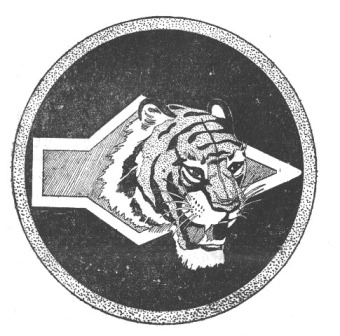



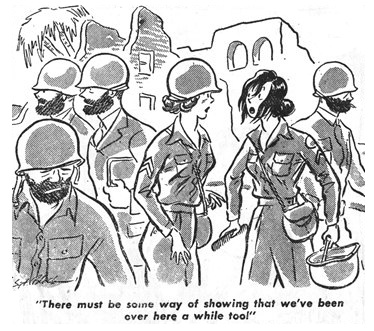
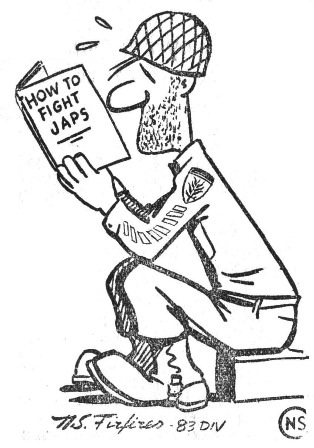
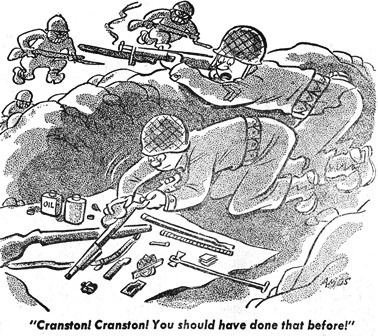 Vehicle and lighting restrictions have been lifted.
Baffle walls and static water supplies can be disposed of.
Arrangements for the sounding of the air raid warning sirens will be relaxed.
And priority of work is being given to fill in slit trenches so as to complete the work before the height of the monsoon season.
Vehicle and lighting restrictions have been lifted.
Baffle walls and static water supplies can be disposed of.
Arrangements for the sounding of the air raid warning sirens will be relaxed.
And priority of work is being given to fill in slit trenches so as to complete the work before the height of the monsoon season.
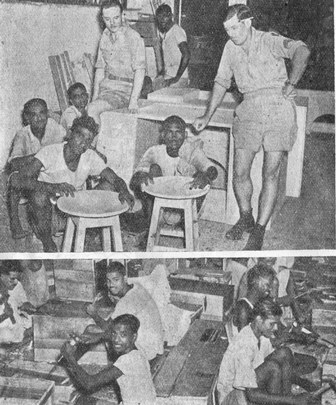 Upper picture: Pvt. Philip D. Adair (left) and Cpl. Willis S. Wagner (right) taking a moment's break to have their photo snapped in the finishing department where the Indians are sanding desks and stools.
Upper picture: Pvt. Philip D. Adair (left) and Cpl. Willis S. Wagner (right) taking a moment's break to have their photo snapped in the finishing department where the Indians are sanding desks and stools.
